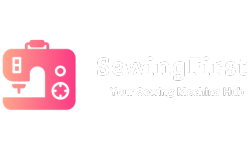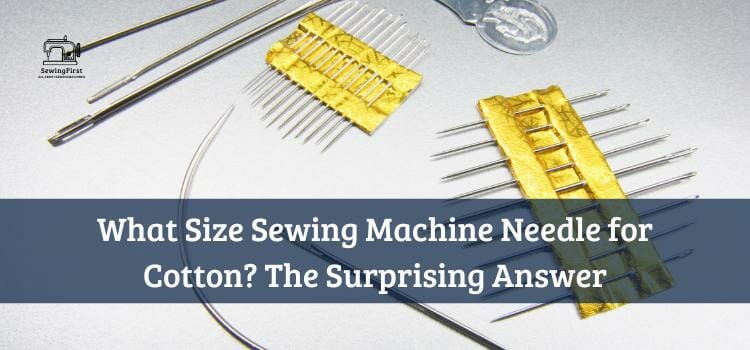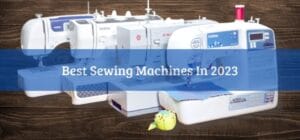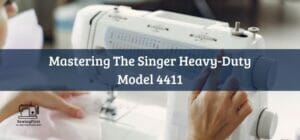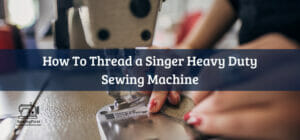Do you want to sew with cotton fabric but don’t know what size needle you need? Finding the right size sewing machine needle is essential for successful projects. Whether you’re a beginner or an advanced sewer, it’s important to understand how different types of fabrics require specific needles.
Knowing the proper size needle for your project can save time and energy, as well as provide a better end result. In this article, we’ll explore the basics of determining what size sewing machine needle should be used when working with cotton fabric.
When selecting your sewing machine needle, there are several factors that come into play:
- type of fabric being sewn
- desired finish/look of the item being made
- and thread thickness.
For instance, if you’re making jeans out of denim fabric then a heavier weight needle would be needed than if you were crafting something light like curtains from muslin. The same holds true for cotton; in order to get the best results possible, it’s important to choose the correct size needle according to these three criteria.
Ultimately, no matter what kind of project you have in mind – whether quilt blocks or t-shirts – having the right tools will make all the difference! With just a bit of knowledge about which size sewing machine needles work best with cotton fabrics, you’ll be able to tackle any task confidently and efficiently.
Keep reading to learn more about choosing the perfect size needle for your next cotton project!
Related Topic: What Do the Colors on Sewing Machine Needles Mean: Uncovering a Mystery
Table of Contents
ToggleWhat Size Sewing Machine Needle For Cotton? The Answer!
Have you ever been overwhelmed when selecting the right size sewing machine needle for cotton fabric? With a variety of sizes available, it can be difficult to know which one is best. But there are some helpful tips and tricks that make choosing the perfect needle easier.
When looking for a specific needle for cotton fabrics, consider the weight of your fabric first. Heavier materials will require a larger needle while lighter materials need smaller needles.
It’s also important to think about what kind of stitch you’ll be creating with your project as this affects the ideal size too. For example, decorative stitches usually call for a slightly finer point than regular stitching does.
The range of options can seem overwhelming at first but luckily there are tools out there to help simplify the process. Needle manufacturers often provide charts on their websites or product packaging to guide sewers in identifying the correct type and size for each different fabric type.
Additionally, many shops offer sample packs so customers can try out various sizes before committing to one particular option.
Armed with these resources and knowledge of how weight and types of stitches affect the selection, it’s easy to find just the right-sized needle for any cotton project!
Types Of Sewing Machine Needles
Finding the right needle for your sewing project can make a world of difference. It’s like finding that special ingredient to bring everything together. Whether you are creating something as delicate as a chiffon blouse, or something more robust such as denim jeans, selecting the ideal size and type of sewing machine needle will help ensure success in your next venture.
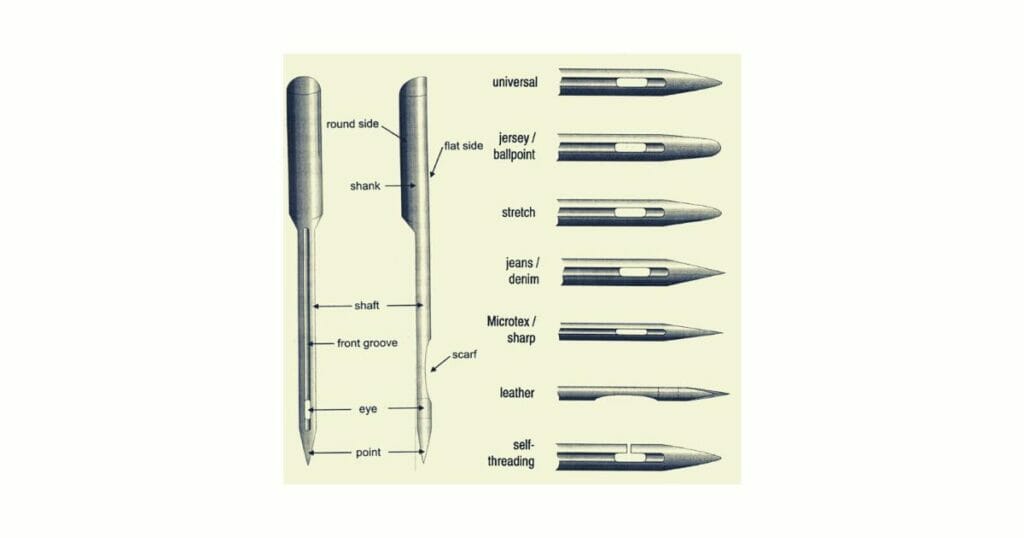
There are several types of needles available for use with different fabrics. A ballpoint needle is great for knits and other stretch materials as it has a rounded tip which helps avoid damaging fibers when stitching.
Jersey needles have an even sharper point than regular ballpoints making them excellent choices for lightweight fabric including silk and organza while denim needles have a strong shaft designed to penetrate through heavier material such as canvas and upholstery fabric.
No matter what type of material you’re working on, having the appropriate needle size makes all the difference. Different projects require varying sizes ranging from 9/70 to 16/100 depending on the weight of your fabric. Taking into consideration what kind of job you’ll be doing prior to starting any project will save time and effort in the long run!
What Do Needle Sizes Actually Mean?
When it comes to sewing, the needle size you choose is just as important as the fabric and thread. Different needle sizes are designed for different types of fabrics and threads. When working with cotton lawns or other thin materials, selecting the right-sized needle is essential in order to ensure a successful stitch.
In America, needles are marked by their American sizes. This can be confusing if you’re used to metric sizing, but luckily there’s an easy way to convert between them. For most lightweight fabrics like cotton lawns, you’ll want an American size 8 (metric 60).
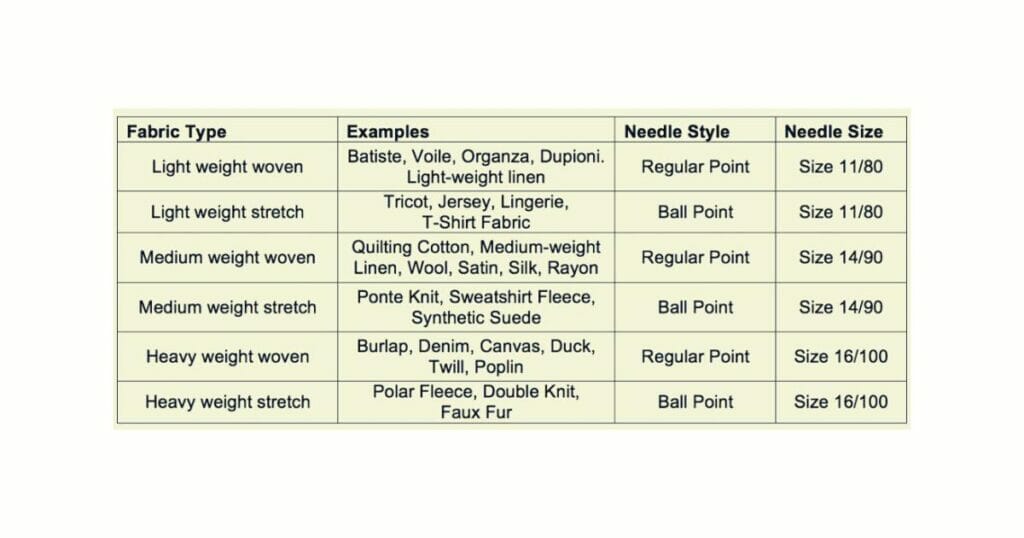
Needle type also matters when choosing the appropriate size; ballpoint needles work better on knit fabrics while universal or sharps needles are best suited for woven fabrics such as cotton lawn.
No matter what fabric or thread you’re using, it’s important that your needle is sharp and clean before beginning any project. That way, your stitches will come out even and strong without causing damage to either your machine or fabric.
With this knowledge in hand, you should have no problem finding the correct needle size for any given task! The next section provides a quick reference chart so that you can easily find the right match for all of your projects.
Quick Reference Needle Size Chart
Are you looking for the best sewing machine needle size to use when sewing with cotton fabrics? Well, a quick reference guide can help! Here’s what you need to know about choosing the right needle size for quilting cotton, universal needles, and cotton shirting.
Let’s start by breaking down the different types of needles available. Universal needles are good all-rounders – they work well on most woven and knit fabric types like denim, jersey, and even some thicker materials such as canvas.
Quilting cotton requires more specialized needles; these have a longer eye that allows them to penetrate through multiple layers of fabric without shredding or damaging the thread. Lastly, there are lightweight and fine fabrics like silk, chiffon, and organza which need an extra-fine needle due to their delicate nature.
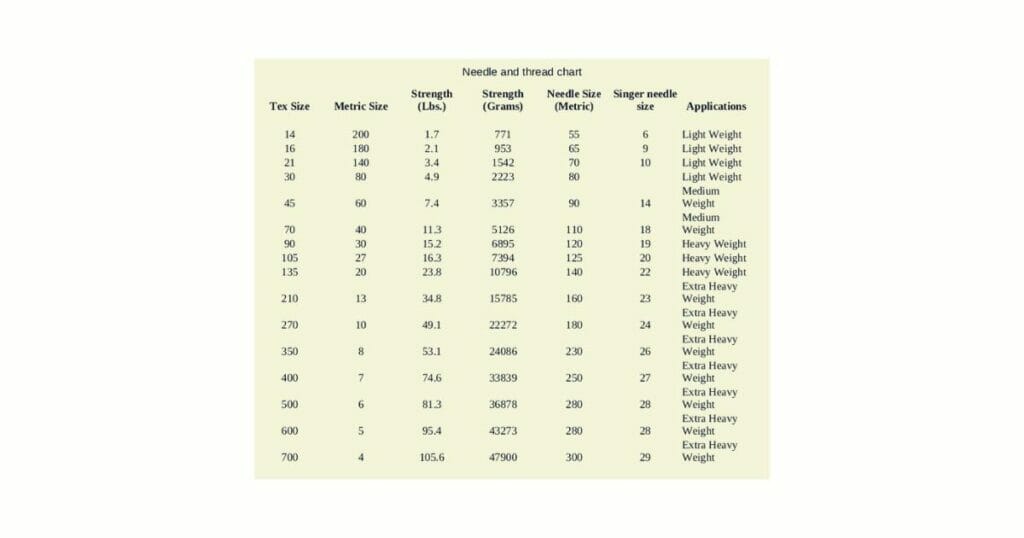
Here is a helpful list of common needle sizes:
- Size 10/70 (or 11): suitable for very light fabrics e.g., quilting cotton
- Size 12/80 (or 14): perfect for medium-weight fabrics such as knits & jeans
- Size 16/100 (or 18): ideal for heavy-duty fabrics like upholstery
These suggestions should give you a starting point but be aware that it may take some trial and error before you find the optimal needle size your project needs. It’s also important to make sure your machine is properly threaded so that it runs smoothly while stitching any type of fabric – from ultra-thin silks to heavyweight canvases! With this in mind, let’s move on to discussing how to choose the right needle type for lighter-weight and finer fabrics.
Needles For Lightweight And Fine Fabrics
When it comes to choosing the right needle for your lightweight and fine fabrics, think of a delicate thread weaving through a cotton fabric – like a spider making its web. Finer needles are essential for these types of projects because they can easily slip between threads without causing damage or breakage.
When sewing with cotton fabrics, you’ll want to use a size 8-11 Universal Sharp point needle that won’t harm the fabric but will penetrate easily.
The eye of the needle should also be small enough so that the thread slips through without snagging. It’s important to note that ballpoint needles may not work well on certain lightweight fabrics due to their larger eyes which can cause drag against the fibers in some cases. For this reason, stick with sharp point needles when working with cotton.
By selecting finer needles for your project needs, you can ensure that the details come out looking smooth and even while protecting those delicate threads from unnecessary wear and tear. With just one simple choice, you’re well on your way to attaining professional results!
Needles For Medium Weight Fabrics
The types of needles we use to create our projects can be seen as a metaphor for the paths we take in life. When it comes to medium-weight fabrics, there are specific needles that provide the best possible results. But which type should you choose? Let’s explore what kinds of medium-sized needles are available and their features.
When navigating through the various options of needles, one must consider what they need and how those needs match up with the different types of medium-weight fabrics. Ballpoint or stretch needles might work better on knits while universal or denim needles may help when sewing heavier materials like jeans or canvas. Each type offers its own unique capabilities depending on the fabric being used.
No matter what kind of needle is chosen, all have similarities such as size and shape; most feature a round shank, flat backside, and rounded point tip. In terms of size, a standard range for these types of medium-weight fabrics would typically lie between 8-12 millimeters long — although this varies depending on material thickness and desired outcome from stitching.
The right choice will depend upon your individual project needs so make sure to get the correct size needle before beginning! With an understanding of all these aspects, selecting the proper needle provides confidence to tackle any job involving medium-weight fabrics.
Needles For Heavy Fabrics
When sewing with heavier fabrics, it’s important to use the right needles. Depending on the fabric, you may need a larger needle or an especially designed one for more challenging materials such as leather and stretchy-knit fabrics.
For tougher projects like these, you’ll want a larger needle that can handle thicker threads and material without breaking. A stretch needle is specifically designed for knit fabrics, while leather needles should be used when working with leather or suede. These specialty needles have just enough sharpness to penetrate through tougher fibers but still provide smooth stitches in your work.
Choosing the correct type of needle will make all the difference in your project’s success! Make sure you select the appropriate size and design based on what kind of fabric you’ll be using – this will ensure that your stitches come out looking perfect every time.
Up next: The universal needle – ideal for general-purpose sewing!
Universal Needle For General Purpose Sewing
A universal needle is like a jack-of-all-trades in the sewing world. It packs enough punch to tackle a variety of fabrics while providing just enough strength for general-purpose use. These needles feature strong shafts and come in both American and European sizes, so you can find one that fits your machine perfectly.
Plus, they have rounded tips, aka ballpoint needles, which make them ideal for working with cotton fabric without causing damage or snagging threads.
These all-rounders are great for basic tasks such as repairing clothes or hemming curtains. They also work well when stitching through multiple layers of thin material like voile or quilting cotton. And because they’re so versatile, they’re perfect if you need to switch between different types of fabrics frequently during a project.
Universal needles provide plenty of power and resilience when tackling most jobs—just don’t expect them to do everything. If you’re looking for precision piecing or topstitching, consider using a sharp needle instead as this will give better results on more delicate materials.
Sharp Needle For Precision Piecing Or Topstitching
It’s like a needle and thread weaving a beautiful tapestry of fabric. Sewing machine needles are the tools that bring your sewing projects to life, and choosing the right one is essential! When it comes to cotton knits, you’ll need a sharp needle for precision piecing or topstitching.
Here’s what you should look out for:
- Sharp point – This ensures accuracy as you sew pieces together with small seam allowances.
- Small eye – A tiny eye helps to prevent accidental skipped stitches when stitching on delicate fabrics.
- Thin shaft – Look for a thin shank so that the needle slides easily through dense layers without bunching up the material.
For any project involving lightweight cotton and knit fabrics, these features make all the difference in achieving even stitches and professional results. So be sure to select the best sewing machine needles that will help create those perfect details!
Jeans/Denim Needle
Every sewist needs to know the types of needles used for specific fabrics. If you are working on jeans or denim, then a jeans/denim needle is what you need!
This type of needle has a sharp point and it’s specially designed for sewing through thick synthetic fabrics like denim. It’s also thicker than other needles so that it can penetrate through multiple layers without breaking.
When selecting your jeans needle, consider the size number as well as the type. A higher size number indicates a larger diameter needle with an increased strength – perfect for heavier-weight denim. On the other hand, smaller numbers indicate thinner needles which should be used when piecing fine fabrics together – such as topstitching details.
No matter what type of fabric you’re sewing with, having the right tools makes all the difference in achieving professional-looking results! Investing in quality supplies ensures that your projects will turn out looking their best – and using a jeans/denim needle is no exception!
Knits/Jersey Needle
When selecting the right needle for your project, knits/jersey needles are ideal for elastic fabrics and sheer fabrics. They have a strong shaft that helps prevent skipped stitches when sewing these materials.
When using this type of needle, you’ll experience smoother stitching with less breakage than other types of needles. It’s important to note that knits/jersey needles come in different sizes as well so make sure you use one specific to the fabric weight you’re working on.
From lightweight jerseys and double-knit fabrics to stretchy wovens, there is a variety of projects where knits/jersey needles can be used effectively.
Additionally, they create beautiful topstitching on garments even without needing an additional stabilizer which makes them a great all-around choice if you don’t want to carry multiple types of needles. Plus, their eye design works perfectly with synthetic threads like polyester or rayon too!
Using a knits/jersey needle will help ensure your project looks professional and won’t unravel over time due to weak stitching points caused by fabric stretching.
So no matter what kind of garment or accessory you may be creating out of knit fabric, having this kind of needle handy is always a good idea! Transitioning into the next section about the ‘stretch needle’, let’s look at how it compares and why it might be beneficial for certain projects instead.
Stretch Needle
When it comes to cotton fabrics, the best needle for heavy materials is a stretch needle. It’s specifically designed with an extra-sharp point and reinforced blade that can easily penetrate through fabric layers without damaging them. This makes it ideal when using decorative stitching on heavier fabrics such as cotton lycra or denim jeans.
The stretch needle is also great for sewing knits or jersey material due to its ballpoint tip which helps prevent skipped stitches and adds strength to your seams. Its sharpness allows you to effortlessly pierce through multiple layers of both natural and synthetic fibers while providing a more secure seam than other needles.
By investing in a good quality stretch needle, you’ll be able to achieve professional-looking results with all types of light-to-heavy weight cotton fabrics, making this one essential tool worth having in your sewing kit! Transitioning into different types of cotton fabrics, there are certain recommended needle sizes depending on the projects you’re working on…
Recommended Needle Sizes For Different Cotton Fabrics
When it comes to sewing, needles are the unsung heroes. While they might seem like small and insignificant tools in comparison to our beloved machines, without them we wouldn’t have any of the beautiful garments that come out of our creative minds.
But what type of needle is needed for a particular fabric? When working with cotton fabrics, there are certain types of sewing needles you should use to ensure your garment remains durable and secure.
There are several different sizes of sewing needles available on the market today; each size is optimized for use with various types of material- from lightweight chiffon to heavy denim jeans.
For cotton fabrics specifically, there’s no one-size fits all solution: depending on your project, you’ll need a variety from thin universal needles (for fine batiste) to medium quilting or topstitch needles (for thicker cotton).
A good rule of thumb when selecting an appropriate needle size for cotton is to match the thickness and density of the fabric as well as its weave structure.
In order to get the most successful outcome when working with cotton fabrics, research which type and size needle will be best suited for your specific project.
The right combination can not only help reduce thread breakage and puckering but also make sure that your stitching looks neat and professional – whether it’s a delicate blouse or heavy curtains! With just a little bit of extra effort upfront you’ll be able to find the perfect needle so you can confidently move ahead with creating something special.
Needle Troubleshooting Tips
When it comes to needle troubleshooting for cotton, nothing is more daunting than the fear of making a mistake. From embroidery needles to quilting material, navigating through different types and sizes of needles can be overwhelming. But with some practical tips and tricks, you can easily find the best size for your project!
For starters, let’s talk about choosing the right type of needle when working with cotton. Embroidery needles are perfect for creating neat stitches on any kind of fabric such as count quilting cotton material or lightweight layers of fabrics like voile.
Additionally, they create beautiful seams that hold up in laundering well – something essential when sewing with this delicate fiber.
On the other hand, if you’re working with thicker materials like denim or canvas then opt for heavy-duty needles designed specifically for thick fabrics and topstitching. Not only will these help prevent skipped stitches but they’ll also provide strong and even stitching every time.
For precision work such as appliquéing cotton onto another type of fabric, use sharp point needles which produce cleaner results without damaging fragile fibers like lawns or chiffon.
No matter what type of needle you choose, make sure it is the correct size too; buying one that’s too big might cause puckering while using a small one might result in breakage during sewing. The key here is to test out a few before settling on one so take advantage of sample swatches whenever possible!
Conclusion
When it comes to choosing the right size needle for cotton, you need to take into account the type of fabric and what kind of stitch you are looking to create. As a general guide, use a smaller needle when working with lightweight fabrics such as muslin or lawn – up to 70/10.
Finally, be sure to keep an eye out for any problems that may arise while sewing with a particular needle size. If you find your threads snapping or skipping stitches switch out the needles until you find one that works perfectly for your project. With this simple technique, you’ll soon master the art of finding the perfect-sized sewing machine needle for cotton – as easy as pie!
FAQs
What are 90 14 needles used for?
90 14 needles are commonly used for sewing machines, typically for heavier fabrics such as denim, canvas, and upholstery. They are also used for quilting and embroidery projects.
.
What is a 80 12 needle used for?
A 80 12 needle is used for sewing. It is a larger needle that is used for heavier, thicker fabrics.
What are the best sewing machine needles for cotton?
The best sewing machine needles for cotton fabrics are universal needles, size 80/12 or 90/14. Universal needles have a slightly rounded point that can handle most woven fabrics, including cotton, without damaging the fibers.
What needle is best for thin cotton?
A size 8-10 (US) or 4-5 (UK) needle is best for thin cotton fabric.
Can I use a 90 14 needle for denim?
Yes, you can use a 90/14 needle for denim. Make sure you use a strong needle such as a denim needle, otherwise the needle may break.
What does 90 14 mean on a sewing machine needle?
90/14 is the size of the sewing machine needle. It refers to the diameter of the needle (90) and the length of the shaft (14).
What is the best needle size for beginners?
The best needle size for beginners is a size 8 (5mm) or 9 (5.5mm). Larger needles are easier to manipulate and provide a good starting point for beginners.
